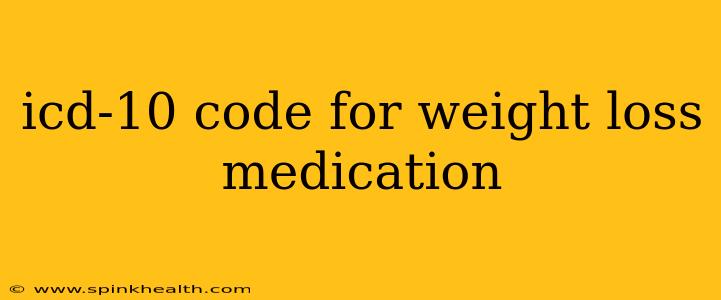The ICD-10 Code Conundrum: Weight Loss Medication and Medical Necessity
The search for the perfect ICD-10 code for weight loss medication often leads to a dead end. Why? Because there isn't one single code that neatly encapsulates the entire process. The ICD-10 codes used depend entirely on the reason for prescribing the medication and the patient's underlying condition. It's not about the medication itself, but the medical necessity driving its use. Think of it like this: a code for a hammer doesn't tell you if it's being used to build a house or break a window.
Let's unravel this mystery, exploring the common scenarios and their corresponding codes. This journey requires understanding the crucial difference between using medication for obesity treatment versus treating a related condition.
What are the most common reasons for prescribing weight loss medication?
This is the key question. The ICD-10 code hinges on this answer. Weight loss medications aren't generally prescribed simply for weight loss. They are used to address underlying health conditions exacerbated by obesity.
What are some ICD-10 codes commonly used in conjunction with weight loss medication prescriptions?
Several codes might be used, depending on the patient's diagnosis. These codes aren't directly for the medication but for the underlying health condition the medication is intended to treat:
-
E66.9 Obesity, unspecified: This is a broad code often used when obesity itself is the primary concern, often in conjunction with other codes specifying related complications.
-
E66.0 Morbid (severe) obesity: This code specifies a higher degree of obesity, implying a greater risk of health complications.
-
E66.1 Obesity with alveolar hypoventilation: This code indicates obesity leading to respiratory problems.
-
E66.2 Obesity with obstructive sleep apnea: Sleep apnea related to obesity.
-
E11.9 Type 2 diabetes mellitus without complications: Weight loss medications are sometimes used to manage or prevent type 2 diabetes complications in obese individuals. Similar codes exist for diabetes with complications.
-
I10 Essential (primary) hypertension: High blood pressure frequently coexists with obesity.
-
I25.10 Atherosclerotic heart disease of native coronary artery without angina pectoris: Weight loss is crucial in managing cardiovascular risks associated with obesity. More specific codes exist depending on the presence of angina pectoris or other complications.
-
K70 Nonalcoholic fatty liver disease: Obesity contributes to the development of nonalcoholic fatty liver disease.
It's crucial to remember these are examples, and the specific code(s) will depend on the patient's individual health profile. A comprehensive diagnosis must be made to accurately reflect the medical necessity for the weight loss medication. Therefore, only a qualified healthcare professional can select the correct ICD-10 code(s) in any given situation.
Does the type of weight-loss medication influence the ICD-10 code?
No. The type of weight-loss medication (e.g., GLP-1 receptor agonists, phentermine) does not directly determine the ICD-10 code. The code reflects the diagnosis that necessitates the medication, not the medication itself.
Can a medical coder determine the appropriate ICD-10 code without clinical documentation?
Absolutely not. Accurate ICD-10 coding requires detailed clinical documentation from the physician detailing the patient's diagnosis, symptoms, and the rationale for prescribing the weight-loss medication. The coder cannot guess or infer the correct code without this information. The physician’s documentation dictates the appropriate code selection.
In short, obtaining the "correct" ICD-10 code for weight loss medication requires a complete understanding of the underlying medical reasons for its prescription. This information is solely available within the comprehensive medical record of the patient. Never attempt to self-diagnose or use this information to determine your own or anyone else's ICD-10 codes. Always consult a healthcare professional for accurate diagnosis and treatment.

